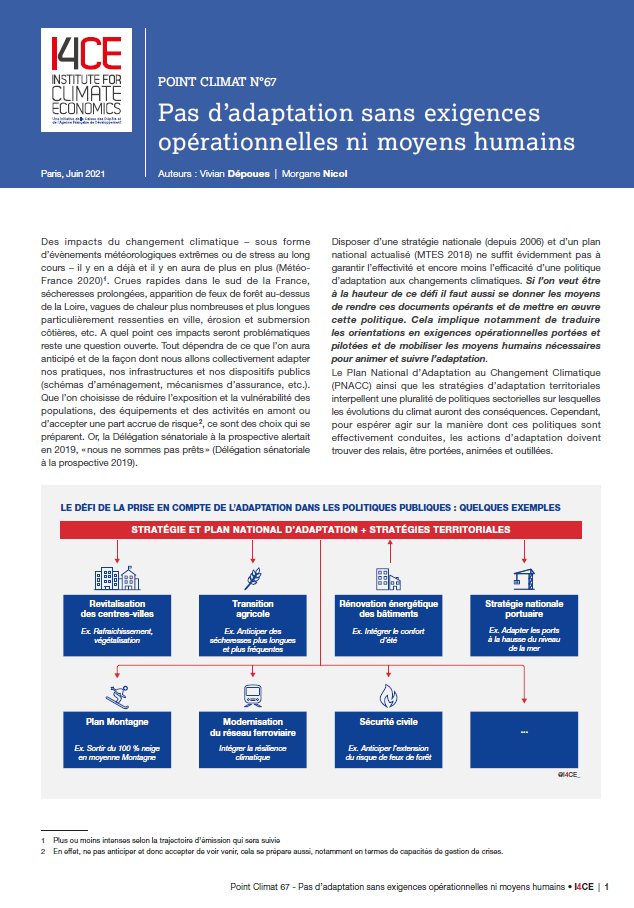No adaptation without operational requirements and human resources
Increasingly frequent heat waves, long droughts, coastal erosion and changing flood risks are all impacts of climate change that will be problematic for the French economy and society. How detrimental this impact will be, will largely depend on what we have anticipated. If we organise ourselves well, we will be able to ensure we make the best decisions for a collective management of risks, development and economic choices, better suited to changing climates. However, regardless of whether we choose to reduce the exposure and vulnerability of populations, facilities and activities upstream or accept an increased share of risk, we must be prepared.
This publication is only available in French
Today we are not ready. There is a French national strategy for adaptation to climate change and a National Plan for Adaptation to Climate Change (PNACC2). However, having plans is of course not enough to guarantee the effectiveness and even less the efficiency of an adaptation policy. What this Climate Brief emphasises is that, as obvious as it may seem, if we want to rise to this challenge, we must also give ourselves the means to make these documents operational and to implement this policy. There are 2 prerequisites for this:
- The various government departments must be able to justify how each public policy concerned contributes to reducing the country’s vulnerability. These policies are clearly identified in the PNACC2 and include environmental, agricultural, economic and international policies, as policies. Analysis of the environmental assessment of the State budget, as well as a review of the climate action plans submitted by the various ministries clearly demonstrate that this has not yet been accomplished.
- The first prerequisite is to demand that organisations in a position to implement adaptation report and be held accountable for the way in which they integrate the subject into each of their projects and each of their long-term decisions. This seems essential when public money is mobilised.
Public project owners or infrastructure managers, for example in the transport sector, must also be able to demonstrate how they are integrating climate change into their investments. It is necessary to check for example, how each new school-building effectively takes into account summer comfort of students to ensure that the next generation of schoolchildren can continue to attend classes in May and June in complete safety.
The second prerequisite is to mobilise the resources, especially human resources, necessary at both the national and sub-national levels, to lead and monitor the adaptation. Adaptation is first and foremost a matter of smart-design and it must consider the realities at a local level. It requires communication, coordination and the ability to be able to take into account what scientists teach us when designing public policies or development projects. This Climate Brief highlights the need to:
- Strengthen the human resources available to the State’s departments and operators concerned with adaptation in order to address this issue;
- Provide visibility on the resources available to those responsible for sub-national adaptation dynamics in order to operate in the long term;
- Guarantee that the engineering offer to local authorities includes adaptation;
- Accompany the demands made of infrastructure managers and public operators with a dedicated budget and/or financing facilities so that they can conduct the necessary analyses and set up adaptation management processes.
Once these two prerequisites have been met, we can begin to put the various adaptation options on the table, compare their costs and discuss, collectively, the level of risk we are willing to accept and the most desirable responses. Then we can begin to talk seriously about the associated investment needs.

